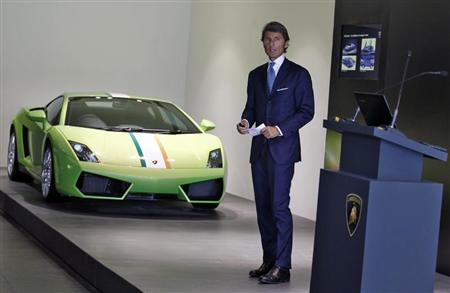Lamborghini bullish on India as China sales wane
Italian car maker Lamborghini will struggle to find another China as sales of its super sports cars in the world's biggest auto market have hit the skids due to a government campaign against conspicuous spending.
Automobili Lamborghini SpA, owned by Germany's Volkswagen AG, however, sees long-term potential in the nascent Indian market and hopes better-than-expected sales in the United States, its biggest market, will offset the China sales slowdown, Chief Executive Stephan Winkelmann said.
"Unfortunately, there are not so many Chinas around the corner. And China for us is a challenge right now," Winkelmann told reporters in New Delhi.
|
 Stephan Winkelmann, CEO of Lamborghini, speaks with the media next to a Lamborghini Gallardo LP 550 during an opening ceremony of a new dealership, in New Delhi Sept 23, 2013. [Photo / Agencies] |
"Still it's a big market, it's our number-two market. But I think, you know, as much as I know about the local policies, and what the government is doing, for the time being it is a little difficult to buy these type of goods."
Lamborghini sales in China grew steadily in recent years to about 230 cars last year, making the country the 'fighting bull' brand's second biggest market after the United States.
Sales of the car are expected to be around 200 this year, said Winkelmann, who was in the Indian capital to launch Lamborghini's second dealership in the country.
The China slowdown is due in part to the new political leadership's campaign against lavish spending and graft.
Super luxury brands, such as Lamborghini, are seen as especially vulnerable to the crackdown on lavish spending as pricey sports cars have come to symbolize corruption in China.
"It was an incredibly rising market for three years when out of nowhere it came to number two market. To answer very clearly, there is no other market which, in this period of time, can grow in this sense," Winkelmann said.
INDIA POTENTIAL
Global luxury carmakers are piling into India, Asia's third-largest economy, and recent high-profile launches include the Jaguar F-Type, whose price starts at about 14 million rupees ($226,000).
But high import duties, with tax on some luxury cars exceeding 100 percent, as well as potholed and congested roads in major cities are a challenge for luxury car makers like Lamborghini, which expects to sell more than 20 cars in India this year, up from 17 in 2012.
The base model Lamborghini in India starts at $370,000.
Annual sales of luxury cars in India stand at just about 1 percent of the total car market, compared with around 7 percent in China.
Although the Indian economy has slowed over the last year, luxury carmakers see tremendous growth potential in the country, which, according to the Boston Consulting Group, had 164,000 millionaire households in 2012.
"This is an opportunity we see for our future. And we hope that sooner or later, in terms of taxation, in terms of infrastructure, this is going to be easier to market, and then you have the opportunity to grow in numbers," Winkelmann said.
The luxury car sales in India is expected to rise to 41,339 in 2018 from an estimated 16,524 this year, according to LMC Automotive. China's luxury vehicles market is expected to rise to 1.5 million in 2018 from an estimated 800,364 this year, it said.
In an effort to raise sales that far lag emerging Asian rival China, the German big three of Mercedes-Benz, Audi AG and BMW AG are trying to win buyers outside the ultra-rich with locally-made hatchbacks and smaller cars.
The bet seems to be paying off, with Audi reporting a 19 percent rise in its January-August sales, while Mercedes said its sales rose 32 percent in the April-June period, helped by the launch of its compact A-Class model.
IHS Automotive forecasts Lamborghini will sell 44 vehicles in India in 2018.
"(Taxation) is a challenge for the super sports cars. The traffic, the road conditions. I remember first time I came to India, it was very different. So I think that there is a huge effort which is done, but still, but it is a small market, and taxation is not helping us as I said," Winkelmann said.



















